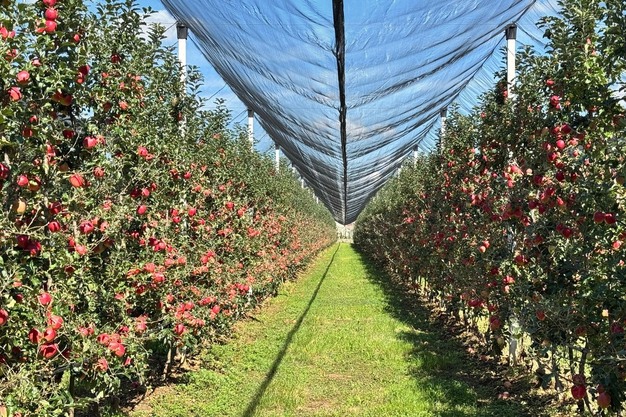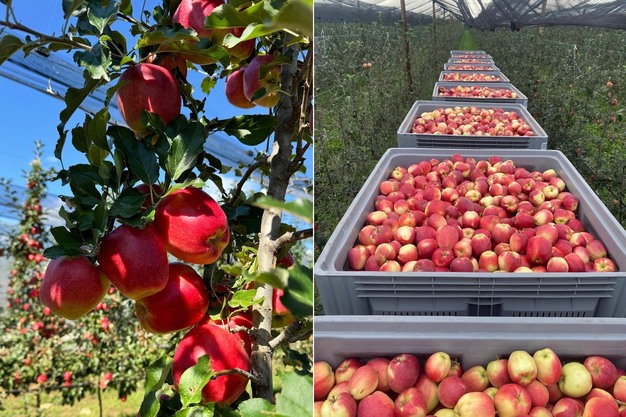The extra-sweet Sambóa apple is now in its second commercial season, and production has almost doubled compared to last year, as it is becoming increasingly popular among consumers. The harvest of these apples started on August 20th with the Luiza variety, the earliest of the three that make up the brand, and the product hit the shelves on September 1st.
 © Sambóa Grupo Rivoira
© Sambóa Grupo Rivoira
"We've achieved extraordinary sales in the first few days of the season, around 1,500 tons in the first 10 days, which is an impressive response from consumers. Sambóa hits the market when only the Gala variety is available for reference, bursting onto the market with an extra-sweet flavor, a very striking color, and so much juice that it fills your mouth," says Marco Rivoira, CEO of Grupo Rivoira.
The weather has been perfect for the apples, with 10 to 11 degrees Celsius at night in Piedmont. "Everything has gone according to plan, without any surprises, and we are getting apples with a high organoleptic quality," says Rivoira. "Consumers are praising us after tasting the product."
 © Sambóa Grupo Rivoira
© Sambóa Grupo Rivoira
"I think that setting the start date on September 1st has been a very good decision, as this way, expectation builds up each year. With its tree-ripening concept, Sambóa is a project that is focused on the end consumer, who rewards us with their purchases. There are many options in the apple market, so you can only achieve this with an extraordinary product. The fruit's a commodity, so if the consumer doesn't go 'wow' after they try it, you won't succeed," says Rivoira.
Grupo Rivoira has gone from 4,000 tons in its initial campaign last year to 7,000 tons this year, with the prospect of reaching 12,000 tons next year. "This year we are starting to have a significant volume of Sambóa, so more marketing campaigns are being organized in Spain and Italy, with tastings in supermarkets and greengrocers that are really paying off." © Sambóa Grupo Rivoira
© Sambóa Grupo Rivoira
The Luiza variety is doing very well, according to Rivoira. "Because of this, it already accounts for 54% of Sambóa's production. Its profitability is very high, and producers love to grow it. It is followed by the Venice variety in January and the Isadora in May."
Grupo Rivoira's objective is to be able to have Sambóa available all year round, which they hope to achieve by 2027. Last year, an agreement was reached with three Chilean companies, which together have 450 hectares in the Andean country, while this year they will announce the incorporation of two large producers, one in Europe and the other in New Zealand.

In general, according to Marco Rivoira, "the apple season is expected to be good for European growers in a year in which there will likely be a lack of fruit from third countries such as Turkey, which will free up space in the market for low-priced products. Although sales may be slower in the first two months of the season, they are expected to pick up from late October or early November. We will have a similar season to last year's, with good opportunities in Latin America, the Middle East, and Southeast Asia."
 For more information:
For more information:
Marco Rivoira
Rivoira Giovanni & Figli spa
Via Mattona 174/c 12039
Verzuolo, CN, Italy
[email protected]
www.samboa.it
